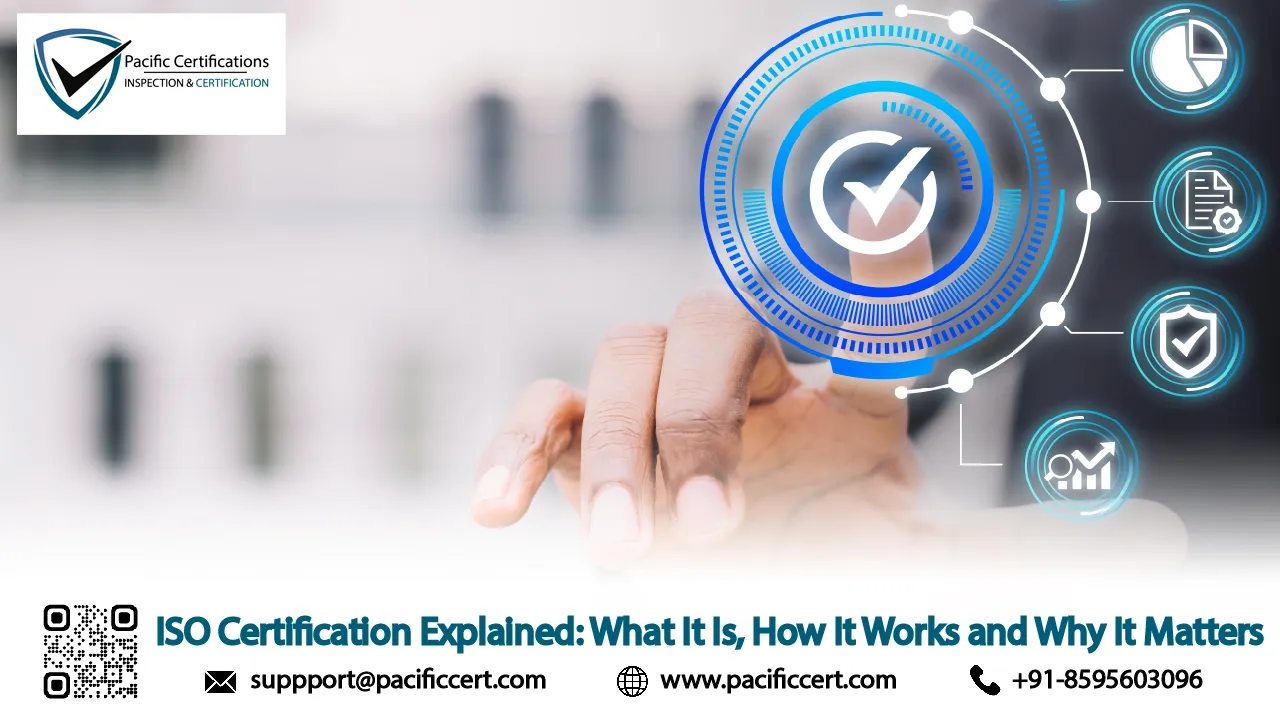What is ISO Certification, How It Works and Why It Matters?

Quick Summary
“In this guide, ISO certification is defined as the formal recognition that your organization has effective management systems in place—such as for quality, safety, or information security—not a promise of flawless products. It emphasizes that real value lies not in documentation alone, but in the continuous implementation and improvement of those systems. The certification process assures consistent quality and risk mitigation, while performance still depends on how well the systems are managed. The article also outlines the path to certification—from system design and internal audits to third-party audit and certification—and underscores how meaningful certification is rooted in solid ongoing practice rather than paperwork.”
What is ISO Certification?
ISO certification is a recognized international standard that organizations use to show that they are committed to quality, safety and efficiency in each aspect of their operations. Whether you are a small startup or a large corporation, getting ISO certification can play a major role in ensuring their products and services actually satisfy customer and regulatory requirements. In this blog, we will clarify ISO certification, how it works, and provide answers to questions regarding its relevance and usage.
This initialism stands for the International Organization for Standardization, a non-governmental organization that establishes and publishes international standards. The ISO awards certificates to organizations whose competencies conform to the exacting standards set by ISO in various disciplines, including quality management (ISO 9001), environmental management (ISO 14001) and occupational health and safety (ISO 45001).
Being ISO certified helps an organization having structured processes to ensure continuous improvements, maintain high standards throughout its processes and ensure either the customer expectations are met or exceeded through the delivery of products or services.
For assistance, contact us at [email protected].
Why Does ISO Certification Matter?
ISO certification is recognized across the globe and shows customers and stakeholders that the organization is committed to reaching and maintaining high-quality standards. By using a systematic approach, ISO ensures that processes are streamlined, inefficiencies minimized, and resources used better. ISO standards are customer-focused. They ensure that products and services consistently meet customer needs and expectations. ISO also helps organizations comply with regulations and manage legal requirements, so they avoid fines and legal disputes. ISO also emphasizes continual monitoring and continual improvement in processes through continual evaluation and planning for getting better. This allows organizations to continually adapt to changes in the market.
What are some of the ISO Standards?
There are numerous ISO standards designed to address various aspects of organizational management, product quality, and environmental practices. Below are some of the most widely recognized and implemented ISO standards that organizations use to improve their operations and show their commitment to global best practices.
1.ISO 9001: Quality Management Systems (QMS)
ISO 9001 is one of the most popular standards and is aimed specifically at ensuring an organization meets the needs of customers, and legal requirements while continually improving its processes. It focuses on customer satisfaction, and product quality. It emphasizes continual improvement and efficiency of processes. It also ensures legal compliance and risk management.
2. ISO 14001: Environmental Management Systems (EMS)
ISO 14001 is a global standard for environmental management that enables organizations to improve their environmental performance. It can help organizations minimize their effect on the environment. It establishes frameworks for improvement of environmental performance. It looks at the compliance with environmental laws and regulations.
3. ISO 45001: Occupational Health and Safety (OH&S)
ISO 45001 can be used for work health and safety (WHS) to improve occupational health and safety (OHS) performance and minimize workplace risks, providing a safe and healthy workplace. It strives to prevent all work-related injury and ill health. It establishes processes to manage health and safety risks. It promotes and encourages a compliant safety workplace culture.
4. ISO 22000: Food Safety Management Systems (FSMS)
ISO 22000 is the food safety standard. It relates to the whole food supply chain from farm to fork. It emphasizes food safety and hygiene. It provides the means to identify and manage food safety hazards. It shows compliance with food safety requirements at both the local and international level.
5. ISO 50001: Energy Management Systems (EMS)
ISO 50001 provides a framework for organizations to manage and optimize their energy usage. It ocuses on energy efficiency and consumption reduction. Supports sustainability and reduces the organization’s environmental impact. It helps meet regulatory requirements and energy efficiency goals.
Click here to find out more applicable standards to your industry
Is ISO Just Paperwork?
No, ISO certification is not just paperwork. The documentation part is a very important step in the stages of ISO certification; ISO standards all lay down actionable and practicable processes for an organization to follow which will enable them to improve their business operations. The documentation assists with consistency and decisiveness, but the deliverables are how the processes are implemented, monitored, and improved as needed. ISO certification is not a one-time task; it is a continual commitment to maintaining standards and improving the systems.
Does ISO Certification Guarantee Product Quality?
ISO certification can help organizations meet quality management requirements of ISO, but it cannot promise you will always have a perfect product. It assures that an organization has the systems, processes, and controls needed to maintain consistent quality throughout the organization. Product quality will always come down to how well these systems are implemented, managed, and continually improved over time.
ISO certification can help an organization identify, and prevent problems from having an impact on product quality, however it is the organization’s responsibility to follow these processes to maintain quality at all stages of the production process.
Can Startups Get ISO Certified?
Certainly, startups do have the potential to become ISO certified. In general, if started early, ISO certification can set up a startup with good operational principles, whereas credibility can be built on top of these. While startups do face lots of difficulties competing with established businesses, in a way, ISO certification can differentiate them from these companies through demonstration of commitment to quality, customer satisfaction, and continuous improvement.
While certification can appear demanding for startups with scarcely any resources, it is attainable and proves to be worthwhile in the long run. For starters, a startup may want to go small-scale by picking one standard to focus on-first and then expand into others. For instance, ISO 9001 (Quality Management) could be their initial area of focus.
Can I implement ISO Without a Consultant?
Though you can implement the ISO without a consultant, it would sometimes be more difficult, more so if your company is inexperienced in quality management systems and in the particular ISO standard. ISO implementation consists of being familiar with the requirements of the standard, developing and documenting the necessary processes, internal auditing, and finally preparing for the certification audit.
If there is no competence within your reality to assist you during the implementation, then a consultant can make things easier so that every requirement is smoothly met. They will assist you in the implementation, train you, and prepare you for the certification audit
Contact Us
Pacific Certifications can guide your organization through the ISO certification process, whether you're a small startup or a large enterprise. Our team of experts will help you understand which ISO standards are right for your business, assist with implementation, and support you through certification and beyond.
For assistance, contact us at [email protected].
Visit our website at www.pacificcert.com.
FAQs
Q1: What are the benefits of ISO certification?
ISO certification helps improve processes, improve customer satisfaction, ensure compliance with legal regulations and drive continuous improvement across all processes in the organization.
Q2: Can small businesses get ISO certified?
Yes, ISO certification is accessible to businesses of all sizes. Small businesses can start with standards like ISO 9001 and work their way up, benefiting from improved processes, customer trust and new business opportunities.
Q3: Is ISO certification only about documentation?
No, ISO certification involves creating practical, actionable processes. While documentation is important, the real value comes from implementing and continually improving the systems and processes that meet ISO standards.
Q4: Does ISO certification guarantee product quality?
ISO certification ensures that an organization has processes in place to maintain quality, but it does not guarantee perfect product quality. The standard helps identify and mitigate risks, but the organization must maintain these processes to ensure high-quality products.
Ready to get ISO certified?
Contact Pacific Certifications to begin your certification journey today!
Suggested Certifications –
Read more: Pacific Blogs

